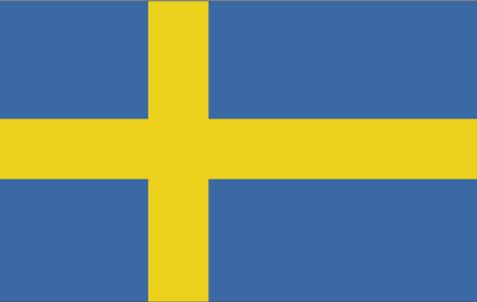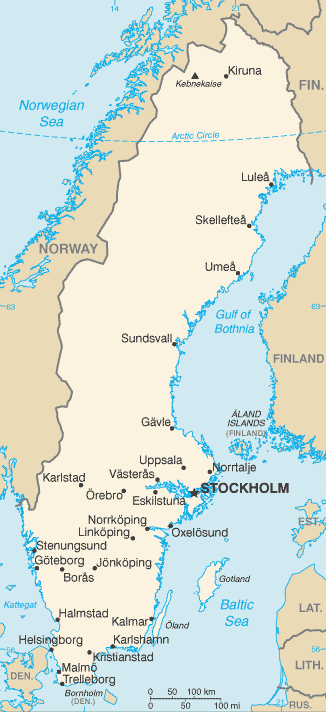Exporting to Sweden


Sweden Country Profile
Official Name (Local Language) Konungariket Sverige
Capital Stockholm
Population 9,880,604
Currency Swedish Krona
GDP $511.4 billion
Languages Swedish
Phone Dial In 46
Sweden Imports Profile
Imports ($m USD) 153,856
Number of Import Products 4,459
Number of Import Partners 218

Sweden Economic Statistics
Government Website | https://www.regeringen.se/ |
| Sovereign Ratings | https://countryeconomy.com/ratings/sweden |
| Central Bank | Sveriges Riksbank |
| Currency USD Exchange Rate | 8.569 |
| Unemployment Rate | 6.9% |
| Population below poverty line | 15% |
| Inflation Rate | 1% |
| Prime Lending Rate | -0.5% |
| GDP | $511.4 billion |
| GDP Pro Capita (PPP) | $49,700 |
| Currency Name | Swedish Krona |
| Currency Code | SEK |
| World Bank Classification | High Income |
| Competitive Industrial Performance | 6/138 |
| Corruption Perceptions Index | 6/180 |
| Ease of Doing Business | 12/190 |
| Enabling Trade Index | 5/136 |
Access trade, receivables and supply chain finance
We assist companies to access trade and receivables finance through our relationships with 270+ banks, funds and alternative finance houses.
Get StartedExporting to Sweden
Sweden exports around $160B and imports around $150B, which results in a positive trade balance of around $10B. The GDP of Sweden is around $570B a year and the GDP per capita was around $44k. The main exports of Sweden are refined petroleum (around $11B), packaged medicaments (around $7B), vehicle parts ($6B), telephones ($5.5B) and cars ($5B). The main imports are crude petroleum (around $11B), refined petroleum (under $8B), cars (around $7.5B), vehicle parts (around $5B) and computers (around $4.5B).
Exporting to Sweden: What is trade finance?
Sweden exports around $160B and imports around $150B, which results in a positive trade balance of around $10B. The GDP of Sweden is around $570B a year and the GDP per capita was around $44k. The main exports of Sweden are refined petroleum (around $11B), packaged medicaments (around $7B), vehicle parts ($6B), telephones ($5.5B) and cars ($5B). The main imports are crude petroleum (around $11B), refined petroleum (under $8B), cars (around $7.5B), vehicle parts (around $5B) and computers (around $4.5B).
Sweden is the twenty-ninth largest export economy in the world and the fourth most complex economy according to the Economic Complexity Index (ECI) member of the EU and the World Trade Organisation and so goods manufactured in the UK are exempt from import duties. Interestingly the Swedish construction sector has an annual turnover of £50 billion and around half of Sweden’s national wealth is spent on construction investment. There is an increasing demand for energy in Sweden and it is estimated that by 2020 it is expected to need an additional 1.3 giga watts (GW) in energy supply; so there has been a more in depth look at renewables. There is an aim that there will be no reliance on fossil fuels by 2030, and there has been a large expansion of solar, biofuel, water and wind power in recent years. By 2020, Sweden is forecast to receive over 60% of its energy from renewable sources. For an expats guide for doing business in Sweden, we’d recommend Everything Sweden.
Chart Showing GDP Growth Compared to rest of world
GDP Composition for Sweden
Agriculture
1.7%
Barley, wheat, sugar beets; meat, milk
Industry
34.2%
Iron and steel, precision equipment (bearings, radio and telephone parts, armaments), wood pulp and paper products, processed foods, motor vehicles
Services
64%
Map
Top 5 Exports Partners
| Country | Trade | % Partner Share |
| Germany | 28,808 | 18.72 |
| Netherlands | 13,749 | 8.94 |
| Norway | 12,483 | 8.11 |
| Denmark | 11,114 | 7.22 |
| United States | 7,930 | 5.15 |
Top 5 Exports Products
| Export Product | Number |
| Petroleum oils and oils obtained from bituminou | 5.9% |
| Transmission apparatus, for radioteleph incorpo | 4.1% |
| Automobiles with diesel engine displacing more | 3.9% |
| Fresh or chilled Pacific, Atlantic and Danube s | 3.6% |
Local Partners
- All Topics
- Sweden Trade Resources
- Export Finance and ECA Topics
- Local Conferences



















